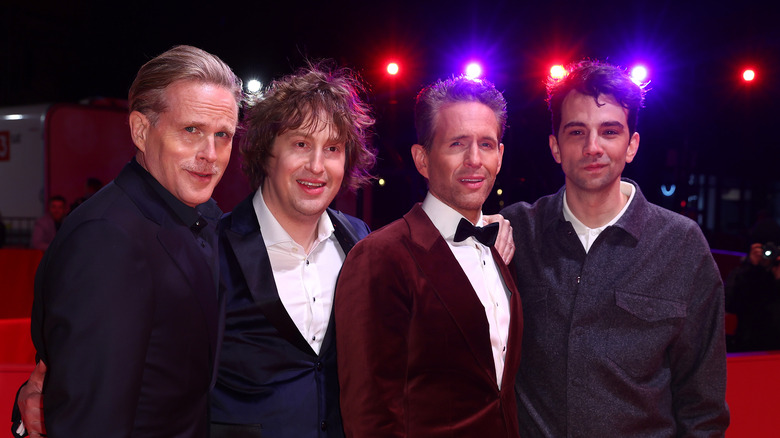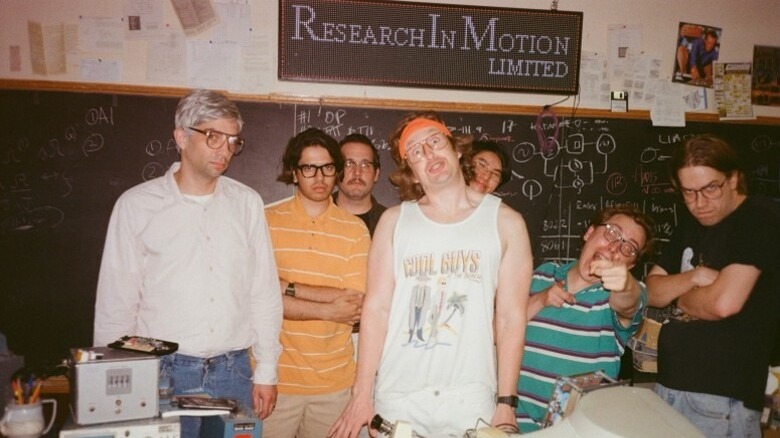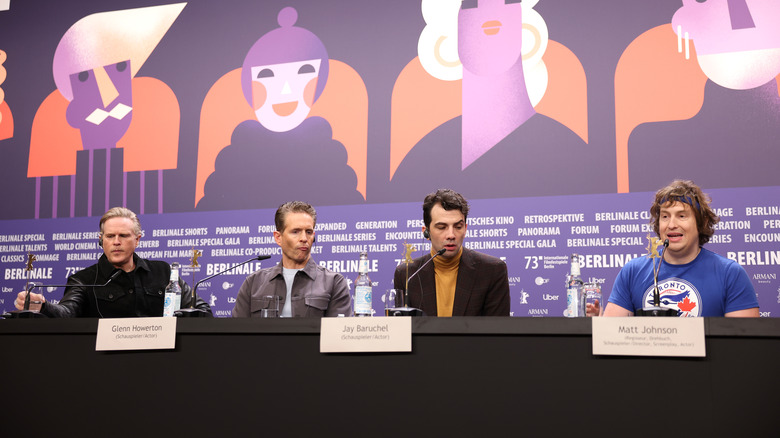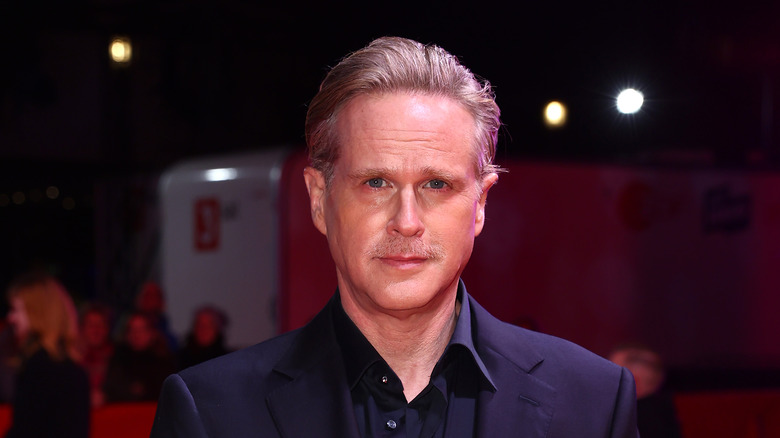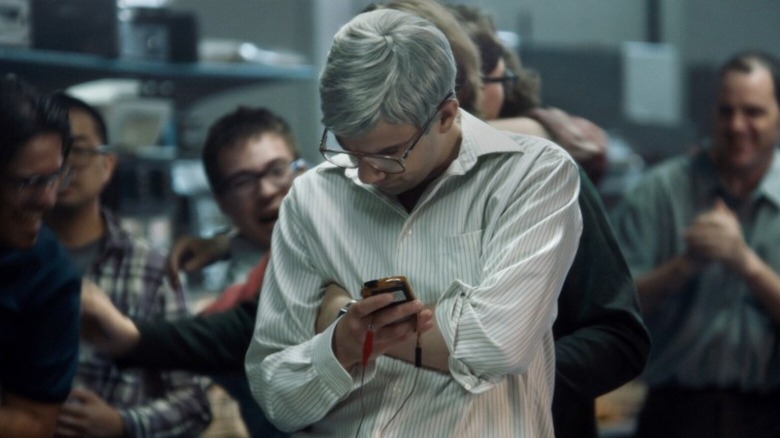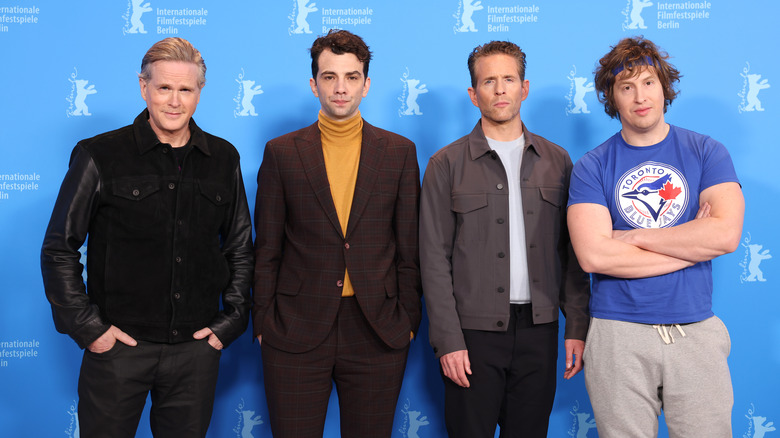The Cast Of BlackBerry Discuss Working Together On A Modern Tech Morality Tale - Exclusive Interview
There's nothing like a true success story — except maybe a success story that eventually ends in dramatic ruin. Such is the tale of "BlackBerry," which premiered at the Berlinale Film Festival on February 17, 2023. Directed by Matt Johnson, "BlackBerry" is a dark comedy that explores the meteoric rise of Research In Motion, the company that built the BlackBerry smartphone and essentially changed the communication game forever. Its founders, Mike Lazaridis (Jay Baruchel) and Douglas Fregin (Matt Johnson), struggle to hang onto the force of their convictions as their co-CEO, Jim Balsillie (Glenn Howerton), focuses on profits above all else. (He's got big plans to buy a hockey team and move it to Hamilton, Ontario, after all, and that doesn't come cheap.)
In an exclusive interview with Looper, the cast of "BlackBerry" — Matt Johnson, Jay Baruchel, Glenn Howerton, and Cary Elwes — discussed the making of their new film, set to hit theaters in the United States soon.
Bringing a Canadian story to life
Matt, you were very involved in this movie in a lot of different aspects — directing, co-writing, acting. What was it about this story that made you passionate about wanting to bring it to the big screen?
Matt Johnson: When I first read the story, I actually wasn't passionate about just the story. I liked the opportunity of telling a story that people didn't have baggage associated with early, [so I could] make it my own thing. I wanted the opportunity to work with actors that I loved and to surprise people. Because nobody knew anything about BlackBerry, this was a perfect canvas to tell a story that was going to make people go, "Whoa, I can't believe that happened." More than anything, that was my interest.
You always hear about Apple and Microsoft and all that.
Johnson: Exactly. People seem to know these stories quite well. Because of that, they bring baggage to their audience that makes them go, "This is what [it is], and here's what I'm going to show you." Whereas this was very fertile ground — nothing had been said. People don't even know who Jim Balsillie and Mike Lazaridis are.
Jay Baruchel: I didn't even know it was a Canadian company.
Johnson: Let alone Carl Yankowski [played by Cary Elwes], who in his own right is a massive business billionaire.
Baruchel: One of history's great monsters.
Johnson: It was a chance to tell a story about characters that nobody knew but who had very deep and rich lives. It was very appealing to me.
Gathering the cast
When you read the script, was there a certain aspect of it that made you excited to sign on for it?
Baruchel: It was wanting to work with [Matt] first because we're one degree of separation. We're both in the Toronto movie world, and I was a fan of all of his s*** before this, so it was a matter of time before we figured something out. I was a big BlackBerry guy, and it was a definitively Canadian morality tale that is also global — this little company in Waterloo that ended up basically setting the stage for the world as we know it in a pretty profound way. All of those things were like, "Oh, this is exactly the kind of stuff I give a s*** about." To get to work with him on this story was super cool.
Glenn Howerton: I felt the same. I felt exactly what Matt felt when he set out to make the film when I read the script. It was a story that I had never heard. I couldn't believe that for a company as large as Research In Motion and BlackBerry — a company that big — I didn't know the backstory behind it. I didn't know it was a Canadian [business] ... There's so many things I didn't know. And the script was ... As somebody who's also spent time studying the craft of screenwriting, I was impressed as a screenwriter.
Baruchel: Hell of a screenwriter. Vivid as f***.
Howerton: It was such a tightly woven story.
Johnson: It was the first time I'd ever written anything.
Howerton: ... Clearly, you did your homework, and you know what you like ... That's a powerful combination. When you've seen a lot of movies and you've absorbed structure in that way, but you also have very strong opinions about what movies should be, that's when you get to make your BlackBerry — whether it's the phone or the movie ... There is a beautiful thing that happens when you think you know how something works, but you actually don't, but you're smart enough to figure it out.
Johnson: Beginner's mindset. It's a gift.
Howerton: Something beautiful happens there. Having a couple films under his belt helped, but the script was brilliant. I talked to Matt, and I felt like I was putting myself in good hands. Then, when we started working on the film —
Johnson: That changed quickly.
Howerton: No — I learned very quickly that I could trust his instincts about something. There were a couple of things he asked me to do in the beginning that I was like, "This does not feel tonally correct." Then I realized that he wanted as many options as possible in the editing room, and I liked that too. I felt like, "If the guy who wrote the script that I read wants certain things acted a certain way, then there's a good chance that it'll work, or he'll use the takes that do work." That was the big thing for me. I had a lot of confidence in Matt.
Johnson: I wasn't going to let anybody look bad. That was my number one ... I love actors, and I love seeing people do behavior where I'm like, "Oh my God, that's compelling." I don't think we ever talked about this on set. Actually, Cary, you and I did briefly ... I was encouraging you to take some big risks. I remember telling you, "I promise, whatever you do, you are going to be happy with what I cut together."
It can be very difficult to have actors do things that are outside of their personality in a big way because they think they're going to get embarrassed. That is a real concern. If somebody was directing me, I'd be like, "I'm not doing that."
Cary Elwes' big comedic risks
Cary Elwes: It's about a safety net. If you have a safety net, and you're confident in the director, and the director is confident in himself and his abilities — I'm not just talking about his directorial abilities, but his writing about it. My manager read this script first ... Normally, little pictures out of Canada — no offense — I was like, "What's this?"
My manager read it and went, "You've got to read this." I read it, and I was sold on page three ... I didn't even know that BlackBerry was named after a stain on a shirt. This was brilliant, and the characters were so compelling. They were perfectly cast — the three of them, their dynamic and their relationship with each other, was so compelling to me when I arrived and watched it that I knew I had to be a part of this thing.
Howerton: I watched you, actually ... I watched you as a very experienced actor, who has been in so many things and had such a long and illustrious career at this point. I watched you walk on, and there's that little bit of a thing — which I totally understand — where you don't know what kind of set you're walking onto. "Are these guys going to be d**ks? Is this one of those sets where people are insecure and no one knows what they want?"
Over the course of the first hour of us working together, I watched you melt. It was really interesting. I watched you go, "Oh, okay. These guys are having fun."
Elwes: It's true. Fun is key, because if you have a director like Matt on the set, relaxation is conducive to creativity. If you're not relaxed and having a good time and having fun, all you get is what Marlon Brando calls a "puckered butthole." I try to avoid those kinds of situations at all costs because I want to be in the moment. You can't be in the moment if you don't have that safety net.
Howerton: It was fun to watch ... You made some bold choices.
Johnson: You guys are laughing in the takes.
Howerton: We always did very grounded, very real takes. But then we would always go a little off the rails just to see what happens. Why not? Why not go off the rails for a couple takes?
Johnson: Cary invented a new rail. It was incredible.
Howerton: It was so funny. You're right — it was the only time in the movie where I was fully breaking.
Baruchel: I corpsed every f***ing time he said it.
Johnson: The first take of that performance ... We shoot two cameras all the time; there's a camera on Jay and Glenn, and a camera on Cary, and Cary's going off in that diner scene. Glenn and Jay [were] looking at him. Because they didn't know what to expect, they were looking at him like this — their eyes go so big. One of these takes is in the film, where Jay is looking, and then he looks back at me, and then turns back to Cary, like, "Is this really happening?" We used it in the film because it's so real.
Howerton: I don't know if any of this is in it, but I definitely got caught [as Glenn] watching him.
Baruchel: I'd forget my lines because I was like, "Holy f***. He's on fire. Where does this come from?"
Johnson: You're like, "Oh, s***. I'm in this movie."
Elwes: It's hilarious. Thank you.
Howerton: It was so fun.
Elwes: It was fun, and fun is important ... I take my work seriously. I may not take myself seriously, but I take my work very seriously, and I felt that with these guys completely. I arrived late on this picture. They were already well into it, but they were so well-defined as their characters. I was admiring them also — not just these gentlemen, but this guy [Matt], to be able to put both hats on, in front of the camera and behind. I was like, "Wow. He's in the movie as well."
That's pressure. I would never have done that to myself. I take my hat off to you for that. That's a hard thing to do, to both stand back and direct and also direct yourself. Only a handful of directors have pulled that off, and you did a great job.
Johnson: It's a huge compliment. Thank you.
Bringing the characters to life
You were talking about how these characters are real people, but they're not Steve Jobs where everybody knows exactly what he looks like and what his persona is. Did you feel a certain level of freedom to be able to bring your own take on the character, or did you feel more beholden to doing research about what the actual mannerisms of the people were?
Howerton: I made a decision very early on, and in having conversations with Matt, about "How accurate do you want it to be to the actual guy?" We both decided very early on that it mattered less to us to portray the man as he really is, simply because there isn't that much footage of him out there. We don't know that much about how this guy was. I took all of my cues from the script and finding those parts of myself that can relate to that level of ruthlessness and ambition, and focused on the man that I was reading in the script and less on the actual man. [I trusted] that [Matt] had done the research and knew who this guy was enough to portray him a certain way in the film that was accurate, to a degree, at least.
Johnson: Jay and I had the exact same conversation.
Baruchel: Same, with the idea that truth and accuracy are not always the same thing. There was a very early conversation about, "Is this an impression, or do you want me to do the heavy lifting as me?" Matt was banking on the idea that whatever it is that I have or have done before, parts of that might work in this context. I basically went off the script and followed MJ. He was my guy on that, on the whole thing. There was a lot of s*** I did that isn't in the movie — it was all off the hip.
Howerton: Speaking to that, [it's] fun to watch Jay work because every take's different. I'm a big fan of that. It's not an arbitrary, "I have to make every take different" — or at least, that's not the impression I got.
Johnson: It's because he doesn't know the script well enough. He didn't know what he was doing. [laughs]
Howerton: It's trying different things ... You never want it to get stale. You want to try different things, and you know when the director gets in the editing room that you're giving them multiple versions of it. I would watch you [Baruchel] do a take that was actually really funny; then I would watch you dial back the comedy aspect of it a little bit; then I would watch you do one that was completely serious. It was always a very real performance. But it was like, "Do you dial up the comedy a little bit? Do you dial it down?"
Johnson: It's what made shooting the film so much fun ... I speak for the scenes where, especially when it's Glenn and myself in a scene with Jay, it always gave us something to listen to. As an actor, listening is everything. If you've got a performer who is always playing a different song ...
Howerton: You're forced to listen, because if you don't, you're f***ed.
Johnson: I don't think you [Baruchel] even knew you were doing this, but it made it so that not only us, but everybody on set, would tune in — because we never knew exactly where you were going to take a place. It made every single shot dynamic from a performance point of view. It was a rare gift that I never could have predicted was going to happen, because it meant none of us could ever go, "Okay, I'm just going to read my lines" ... It was the greatest gift you gave us.
The cast getting along
I know these press days can be long, but it must be nice to hear good things about each other.
Baruchel: We all get on pretty well too. We enjoy each other's company. It was also ... Every time that I thought [Howerton] killed it, I made sure to tell him — same with MJ, and same with Cary ... Why keep that to yourself? If you think somebody you're working with, and you like them, is doing something good, you should tell them.
Howerton: It's funny — I saw an early cut of the film and didn't realize until maybe two weeks later, in the night, that I hadn't texted Jay. I had been texting with Matt, and we're talking about the movie and I'm thinking about the movie. Then I realized, "Oh my God, I haven't even texted Jay."
Elwes: I'm texting him right away telling him how great he was ...
Baruchel: Neither of us texted ... You beat me to it. I didn't f***ing text you either.
Howerton: I know. I'm sitting there, and I realized I had been thinking about how much I love this performance and I was like, "I should tell Jay."
If only you had a BlackBerry, you could have used it.
Johnson: You could have BBM-ed him.
Oh, Canada
You guys [Johnson and Baruchel] being Canadian, this is a Canadian business success story. Did you feel pressure to represent?
Johnson: No, I didn't feel that kind of pressure. Jay had a great line for me. Early on in the film, there was a title card I had up, and it was identifying the place ... It said "Waterloo, Canada." He said, "Why are you saying Waterloo, Canada instead of Waterloo, Ontario?" I was like, "Do people know that Ontario's in Canada?" He was like, "F*** them" ... He made a great point. He was like, "When you see a movie that takes place in Helsinki, they don't say —"
Baruchel: ... "Helsinki, Europe" or whatever. We have this idea, and it's never Americans or Brits or anything that tells us we have to censor it. We pre-censor ourselves, as if there's such a thing as being prohibitively f***ing Canadian. It's nonsense. You'd never put "New York, America." How f***ing dumb would that look? It would look insane.
Johnson: ... There's a way of making it kitschy and cute and funny, also, which "Scott Pilgrim" played with a lot, and we wanted to get away from all of that. It was like, "How can we show Canadians — especially the odd multiculturalism that was happening in Waterloo around university towns at this time — in a very accurate way?" That's what my high school was. My high school was exactly what you see. It's literally verbatim the way that my teen years ...
Elwes: You drew on all of that.
Johnson: That's all it is.
Baruchel: That's all his personal s*** — all the toys and posters on set.
Johnson: It's all mine.
Howerton: He's still dressed like the character ... He's dressed like a f***ing TV character.
Johnson: I'm going to look good on the red carpet. I've got clothes for tonight ...
But I felt no pressure in terms of representing Canada or being like, "This is a Canadian story," because that would've made it too precious. What I wanted to do was show what Canada was like for me, which was that I didn't know the water I was swimming in. I was like, "This is what me and my friends are like."
To American audiences ... Glenn, even, when he first came on set, was watching things. He was like, "Oh." There was something slightly different about it. Jerry Seinfeld has a great line about Canada, which is, "You go up to Toronto and you think, 'It's like America,' but it's like aliens have come and replaced everything and tried to get it all right, but you can tell there's something wrong." Which is funny, because that's exactly how I feel when I go to the United States ... When I go to New York, I think, "Wow, this is just Canada, but everything is slightly weird."
Howerton: Everyone's much more rude.
Johnson: No, that's so wrong. Everybody that I've met in the States has been unbelievably nice.
Should Canada get another hockey team?
Do you have a strong opinion on the Penguins moving up to Hamilton? Would you be in favor?
Baruchel: I remember ... Jim Balsillie was on TV a lot for six months in Canada that year, because for a long time, we only had ... Six out of 30 teams were ours in the game that we invented. There were more teams in places where ice doesn't occur naturally than were in Canada. Everybody was like, "When's the seventh team ... ? We've got to have more." He was the first guy with the means to do it who took that on. Every single one of us, to this day, would love to see the Penguins come to f***ing Hamilton. The 905 [area code] — that whole area — could support another NHL team.
Johnson: At least one.
Baruchel: Easily. Absolutely, I was rooting for him during that whole period. He was a bit of a mini-hero because I was like, "He's a son of a b***h, but he's our son of a b***h."
Johnson: Well, we finally got one. We finally got our own son of a b***h.
Howerton: Jim never pulled it off, though ... He tried three times.
Johnson: Three times, all the way up to suing the NHL. That scene with you screaming at [the NHL owners] basically is a sublimation of years of legal proceedings ... All of those things you're saying [in that scene] are real. It's all real.
Baruchel: All he should care about, as a rich guy, is being more of a rich guy ... [but] that's a purely emotional thing. That's a kid who grew up loving hockey. He was like, "Now I can f***ing do it." But at great risk and personal loss — so I've got to root for him ... No matter what, he's in my good books.
A release date for "BlackBerry" has not yet been announced.
This interview has been edited for length and clarity.
